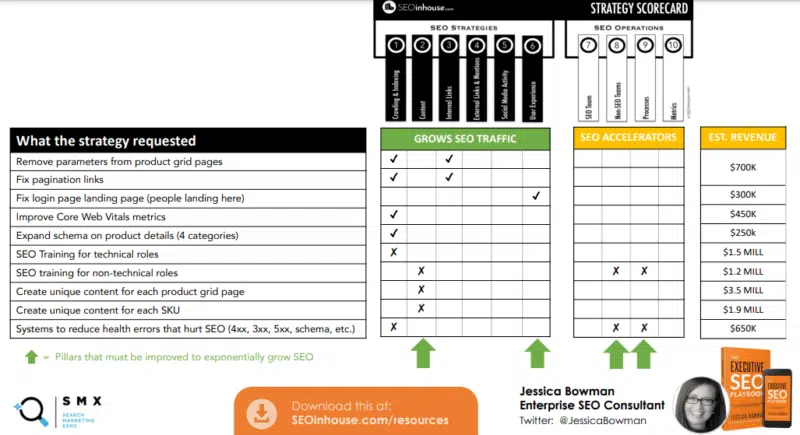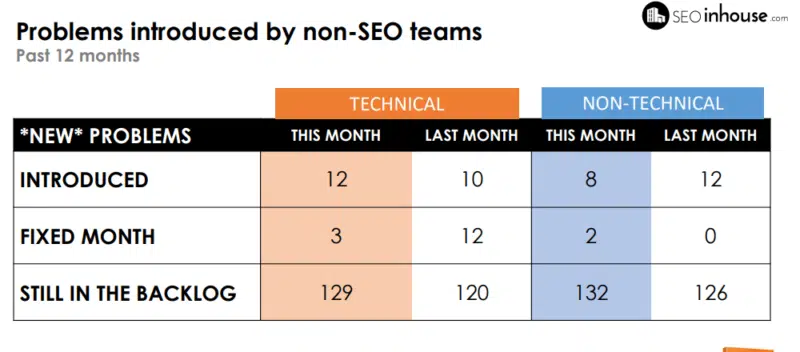3 SEO metrics to help secure executive-level buy-in
Campaign metrics alone may not accurately represent your team's work. At SMX Next, Jessica Bowman shared metrics that can help SEOs change the conversation and get executives to recognize their value.
“When I talk about the metrics that will help you get and secure and keep buy-in, I come to you with a perspective of operations,” said Jessica Bowman, CEO of SEOinhouse.com, in her presentation at SMX Next. “How do we get other people involved in SEO as well?
SEOs are constantly searching for new ways to prove their work’s value to higher-ups. And, many prefer to let the results speak for themselves. But, as Bowman argues, it’s often more effective presenting executives with actionable metrics that get them involved in operations.
Here are three metrics Bowman recommends SEOs hone in on to secure that coveted buy-in so that they can continue to improve the visibility of their brands.
Metrics that can change the conversation
“SEO operations . . . is focusing on how you go about getting the SEO strategies and tactics done,” Bowman said. “Do that well and you start setting yourself apart from the competition because most companies don’t address SEO operations.”
“Now we can take this framework and kind of shrink it down and make it [into] a strategy scorecard,” she added.
The SEO strategy scorecard framework gives executives and other departments a clear look into your tactics and what they’re designed to achieve. In her version, Bowman links these strategies to one of two categories: those that grow SEO traffic and those that accelerate SEO through operations.

Bowman says you can add more insight by featuring metrics such as estimated revenue. Highlighting these numbers can be pivotal in getting executives talking about SEO’s value.
Metrics that can get executives to recognize SEO’s value
“What I find is that SEO teams spend a lot of time fixing SEO problems that other teams introduced,” said Bowman. “And when you’re working on this stuff, it is time not spent on growing SEO revenue.”
Bowman recommends SEOs start reporting on time spent fixing SEO problems stemming from other departments. The goal should be to get executives to realize that prioritizing SEO training and department accountability will prevent these issues.
The point isn’t to create animosity between departments, but rather to identify roadblocks in SEO operations and show why they’re valuable.

Here are specific issues Bowman suggests SEOs identify:
- Changes in core web vitals metrics;
- Changes in page speed metrics;
- 4xx URLs in tags;
- 3xx URLs in tags; and
- Schema errors.
Metrics that can forecast SEO success
Executives and other higher-ups want to know your SEO projects are on track to meet specific goals. That’s why Bowman suggests marketers report on the most pertinent metrics — these are the campaign’s critical drivers.
“It is not uncommon for project managers and executives to talk about critical drivers,” Bowman said. “What is uncommon is to report on critical drivers.”
“These are metrics that tell you, and executives, if you even have a chance of reaching the SEO goals,” she added.

As Bowman says, critical drivers are well-known to the leaders of any organization. But when SEOs lay these out in their reporting, it gives decision-makers a clear roadmap and proves their worth that much more.
“The important thing to think about these critical drivers is that they are reports on the activities that must happen to achieve the revenue goals,” she said.
“When you communicate it in this method, this will get executives focusing on the right teams to do what needs to happen to grow SEO,” she added.
Watch the full SMX Next presentation here (registration required).
Contributing authors are invited to create content for Search Engine Land and are chosen for their expertise and contribution to the search community. Our contributors work under the oversight of the editorial staff and contributions are checked for quality and relevance to our readers. The opinions they express are their own.
Related stories
New on Search Engine Land